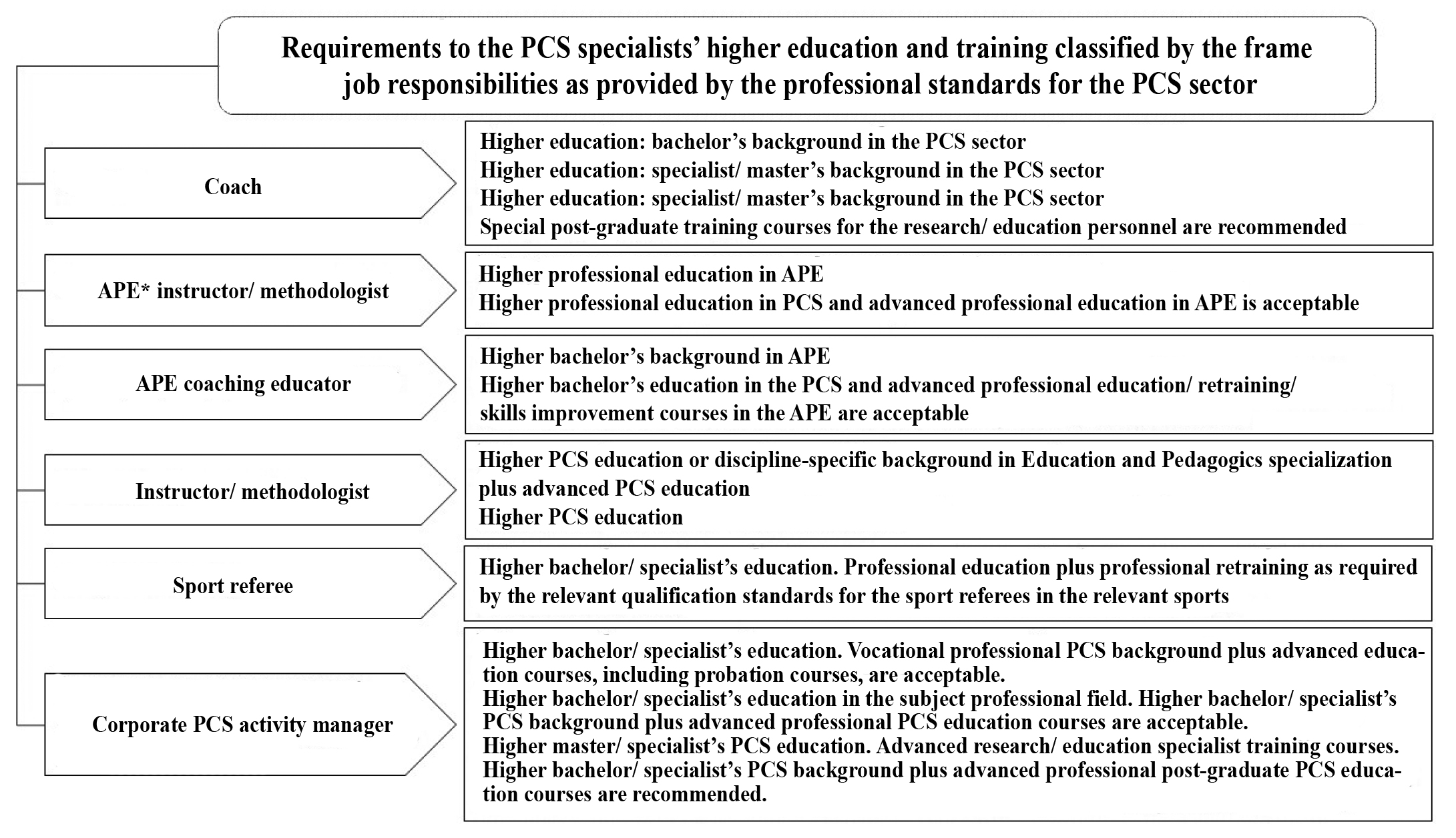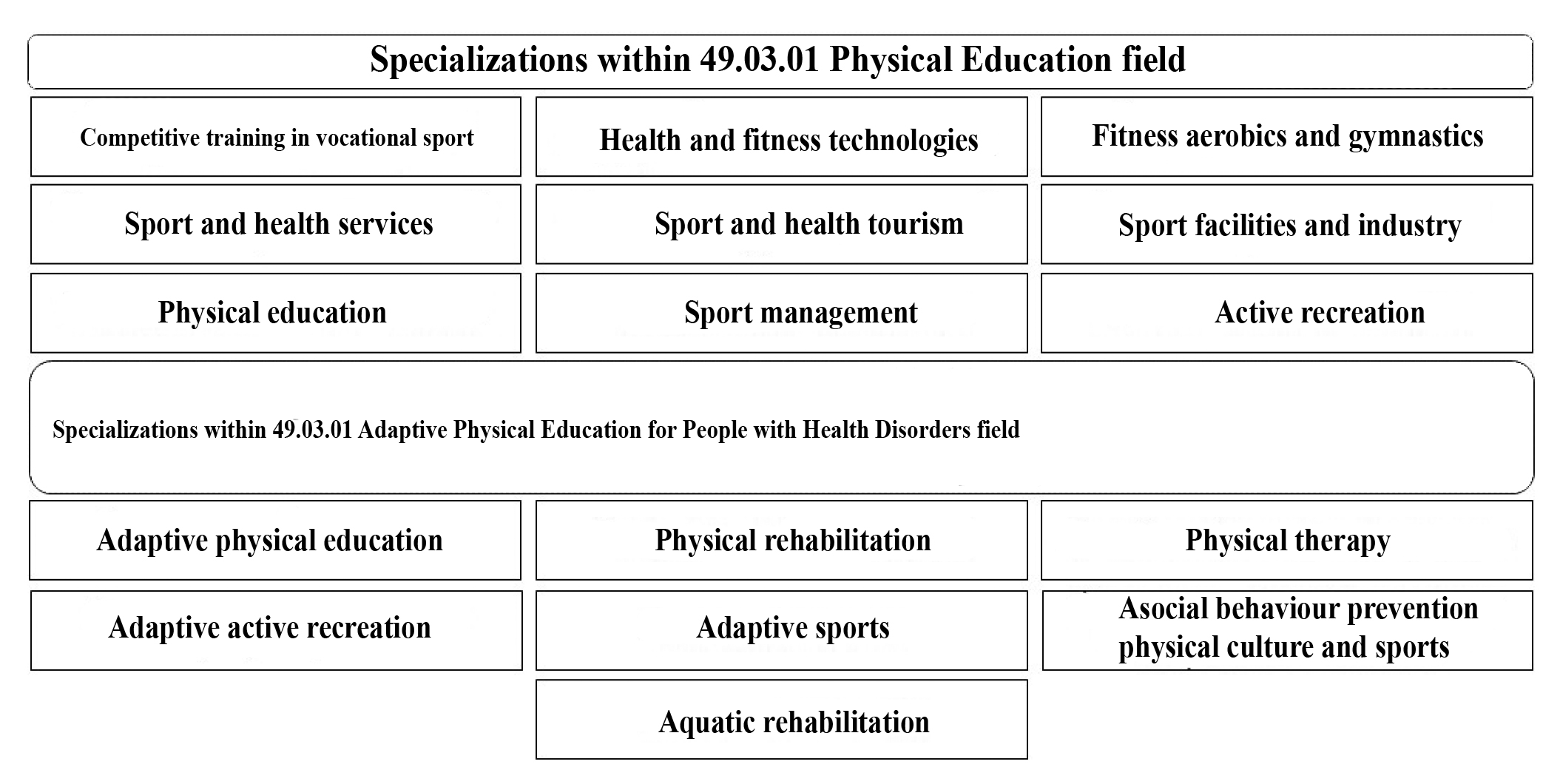Analysis of higher education standards versus professional physical culture and sport education standards
Фотографии:
ˑ:
PhD, Associate Professor N.V. Stetzenko
PhD, senior lecturer E.A. Shirobakina
PhD, Associate Professor M.N. Sandirova
PhD, Associate Professor I.V. Lushchik
Volgograd State Academy of Physical Culture, Volgograd
Keywords: professional standard, higher education, education field specializations, physical culture and sports
Background. Presently the existing qualification system, as provided by the valid Managers, specialists and workforce qualification reference book, is in the process of transition to the system of professional standards. As stated by the system developers, the professional standards will secure the labour market demands being duly met by the national education system.
Objective of the study was to analyse requirements of the valid professional education standards to the physical culture and sports (PCS) specialist education.
Methodology of the study. The study was designed to analyse the professional education standards applied in the national physical culture and sports (PCS) versus the modern requirements to the higher education competences.
Study results and discussion. The declared national policies to ensure the labour market demands being duly met by the national education system soon after the new professional standards are implemented – imply that the education system will produce the specialists with the competences required by the sector employees. What is the actual situation at present? “The Ministry of Labour of Russia has developed and approved ten professional standards for the national physical culture and sports sector including the six standards setting requirements to the higher professional competences of the physical culture and sports sector specialist” [2]. Subject to consideration hereinafter are only those professional standards.
As a matter of fact, the employees’ requirements have been addressed by the job responsibilities as provided by the professional standards that were expected to be implemented on a mandatory basis by the budget-supported organisations as of July 1, 2016. It would be logical to expect that the professional standards should provide specific requirements to the contracted specialist’s education level and specialization, core education discipline and specific specialization within this discipline. Given on Figure 1 are the actual requirements of the valid professional standards to the higher education of the PCS sector specialists.

Figure 1. Requirements to the PCS specialists’ higher education and training classified by the frame job responsibilities as provided by the professional standards for the PCS sector
*APE adaptive physical education
It should be noted that we avoided going into details of specific frame job responsibilities and concentrated only on the requirements to the higher PCS education. All the standards under consideration set forth the following requirements:
- To the education field (PCS, APE, Education and Pedagogics, professional specialization); and
- To the education level (bachelor/ specialist/ master’s competences).
The seven frame job responsibilities set forth by the Coach Standard recommend “advanced post-graduate research/ education specialist training courses” [1]. The same recommendation is provided by the Corporate PCS Manager Standard (in the frame job responsibility 1). However, a recommendation means something that may not necessarily be fulfilled. If so, why is it set forth by the standard? We may only assume that in the situation of contest for one or another vacancy the candidate having a scientific degree may have an advantage.
It should be further noted that no one of the considered professional standards for the PCS specialist provides requirements to a specialization of the education field. Why then the national PCS universities bother to establish different education specializations within one or another field? Some of these education fields offer a few special education specializations to the students. The specialisations determine the core vector of the future professional career of the graduate. However, an analysis of the existing professional standard requirements to education shows that subject-oriented education degree does not mean that its holder cannot hold a position in different specialization within the same education field.
At this juncture, the Federal State Higher Education Standards (FSES) make no provisions for specializations based on education fields, and every university may decide on its own on one or another specialization (and its title) being established, conditional on the decision being endorsed by its own academic Research Council. As things now stand on the national education service markets, the PCS universities offer the following specializations: see Figure 2.

Figure 2. Specializations offered by the national PCS universities
In view of the fact that neither of the above-mentioned specializations of specialist training in the PCS field was covered by the professional standards, we made an attempt herein to match the actual specializations with the valid professional standards. We were governed by the following criterion in the process: whether or not the specialist of some education specialization is “fit for job responsibilities in a specific position” [2].
We found that only two of the six professional standards regulating the PCS sector (namely, the Coach and Instructor/ Methodologist Standards) require higher PCS education for the position; and only one standard (Corporate PCS Activity Manager Standard) requires the candidate have higher PCS education in the speciality or any other higher education in the subject professional field. In these particular cases, the specializations in 49.03.01 Physical Education field may be distributed, in our opinion, as follows: see Table 1.
Table 1. Specializations of 49.03.01 Physical Education field versus the requirements of the valid professional PCS standards
|
|
Professional standard |
|
|
|
Coach |
Competitive training in vocational sport |
|
|
Instructor/ methodologist |
Health and fitness technologies |
|
Fitness aerobics and gymnastics |
||
|
Sport and health services |
||
|
Active recreation |
||
|
|
Corporate PCS activity manager |
Sport management |
|
Sport facilities and industry |
The above distribution of requirements to the academic education competences appears to be fully compliant with the employees’ expectations as to the labour quality and responsibilities in this field of professional activity. The education competences in the Physical Education specializations will be compliant with the professional Coach Standard albeit its detailed consideration falls beyond the purposes of the present study. As far as the Sport and Health Tourism specialization is concerned, we believe that it totally falls beyond the professional PCS standards under consideration.
Two of the six professional standards under consideration regulate the Adaptive Physical Education subsystem of the academic Physical Education field. Given in Table 2 hereunder are the specializations of this education subsystem versus requirements of the relevant professional standards.
Table 2. Specializations of 49.03.02 Physical Education for People with Health Disorders (Adaptive Physical Education) field versus the requirements of the valid professional PCS standards
|
|
Professional standard |
|
|
|
APE Coach
|
Adaptive Physical Education |
|
Adaptive sports |
||
|
Physical therapy |
||
|
|
APE Instructor/ Methodologist |
Physical rehabilitation |
|
Adaptive active rehabilitation |
||
|
Aquatic rehabilitation |
We believe that the Asocial Behaviour Prevention Physical Culture and Sports specialization within this field lacks clearly identified reference points and application area, and it complicates the specialization being regulated by a professional standard.
The Sport Referee Standard deserves special attention and consideration as it requires whatever higher education supported by professional retraining course in the relevant sport discipline. It means in fact that any person, regardless of how far he/ she is from the sport, may qualify for the referee’s position to judge those who have been working hard in and for the sport for many years and perfectly know every technical and tactical detail of the sport discipline. And it means in fact that this standard requirement is ridiculous to say the least. Common logic requires a new specialization called Sport Referee being established in the national higher PCS education system, and this step, in our opinion, could help keep away amateurs from modern sports and strongly improve the refereeing service competency and quality.
Summarising the above, it may be pertinent to answer the question why the valid professional standards are so controversial for the higher education establishments. One of the reasons might have been found by our analysis of the list of developers of the professional PCS standards – that showed, for instance, that the Corporate PCS Activity Manager Standard was developed by sixteen entities including only one academic team (of Moscow State University), the developers’ team being dominated by the sector employees and the Olympic Reserve School teams. No wonder that this and other facts give the reasons to believe that the standards are still imbalanced as they tend to give a top priority to the job responsibilities at sacrifice of the education-competency-related requirements.
Conclusion. The national higher physical culture and sports education system needs to be revised with a special emphasis on the specializations being duly harmonized with the relevant professional standards. With this purpose, the specializations will be approved within the relevant education fields by the relevant federal agency; and the professional competencies will be duly regulated by the relevant education standards with consideration for every specialization specifics. To ensure the education competences being fully compliant with the employees’ expectations, the professional standards must clearly spell out the requirements to the relevant specialization. These revisions, in our opinion, will help train the specialists competent enough to meet every demand of the national labour market. This practical initiative will give the means to do without the personnel certification procedure to verify the individual competency for the frame job responsibilities in the cases when the candidate’s education specialization is found compliant with the relevant professional standard.
References
- Mikhalev V.I., Samsonov I.I., Sapunkov A.A. Problemy i perspektivy podgotovki trenerskikh kadrov kak rabotnikov uchrezhdeniy sportivnoy podgotovki [Coaching staff training to work in sport training establishment: Problems and perspectives]. Omskiy nauchny vestnik, 2013, no. 2 (116), pp.193-199.
- Professionalnye standarty. Fizicheskaya kultura i sport [Professional standards. Physical culture and sport]. Portal of the federal state educational standards of higher education. Available at: http://www.fgosvo.ru/docs/101/69/2/5
- Stetzenko N.V., Shirobakina E.A., Lushchik I.V., Sandirova M.N. Ob izmeneniyakh v trebovaniyakh k fizkulturno-sportivnym kadram [Changes in requirements for physical culture and sports personnel]. Fizicheskaya kultura: vospitanie, obrazovanie, trenirovka, no. 4, 2016, pp.32, 49-50.
Corresponding author: shirobackina_prepod@mail.ru
Abstract
The article analyses the requirements of the national physical culture and sports (PCS) professional education standards versus the higher education standards, and demonstrates the need for some of the professional PCS education standards being revised to harmonize them with the higher education standards.



